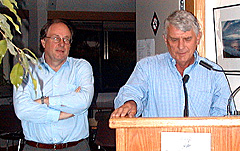|
Willis: straight answersHow did you get to know your successor, John Willis, and what did you see in him and his work that led you to think of him to fill this job here? I got to know him as co-production partner at [Britain’s] Channel Four. We did some Novas, some American Experiences, and he came in on New York. Over and above that, British television is a strange conglomerate of things. The BBC is filled with intrigue and ITV is ever-changing. Among everybody over there, John was the guy you could go to get a straight answer. If he was interested in something, he would tell you, and if he wasn’t, he wasn’t. He was smart about programming. As he moved away from Channel Four he continued to be somebody that we would go to—to try to engage him in a project, or to get a reading on the landscape. He’s somebody we’ve known and respected enormously for a long time. When he resigned from his last position and said he was "bored," we knew what that meant. One of our executive producers suggested that he be considered, since it was known that I would be leaving. I talked to Henry, and I was going to England anyway, so I talked to him to see if he had any interest. And it proceeded from there, over three or four months. The BBC was after him, Discovery was after him, so I think it’s just terrific that he came here. That he chose to do this rather than the other things he might have done—some of which might have paid vastly greater sums of money—suggests that he was the right person. As a British TV executive, he participated in the production of Trainspotting, Four Weddings and a Funeral and other acclaimed films. Is there something that he could do for American drama on PBS? I don’t think John can change the rather dire economics of drama production for public television. We’ve been through this with American Playhouse. It started out close to commissioning films, and wound up as a minor partner in films made for theatrical distribution, which would later come to public television. Low-budget features are $3-4 million. That ends up being $2.5 million per hour. That kind of money isn’t around for public television. If public television could amass $500,000 an hour, it still would have a 20 percent stake in those films—a minority ability to influence what they are. People who contemplate selling tickets in theaters would determine what they are. It’s not clear that public television would be doing anything more than, in effect, licensing films that appear in theaters. Is there anything about American public television that’s going to be an adjustment for him, coming out of the British system? In Britain the money often starts in the hands of broadcasters and they decide what to spend it on. Here you start with ideas and see if you can aggregate money for them. That’s the fundamental difference. What will be your most important messages to Willis as he starts the job? I don’t know that he needs important messages from me. I’ve tried to brief him on the people and what I think their virtues are. And what we have in the works. I think he’ll do fine. END
|
||||
Web page posted Sept. 4,
2002
Current
The newspaper about public television and radio
in the United States
A service of Current Publishing Committee, Takoma Park, Md.
E-mail: web![]() current.org
current.org
301-270-7240
Copyright 2002


